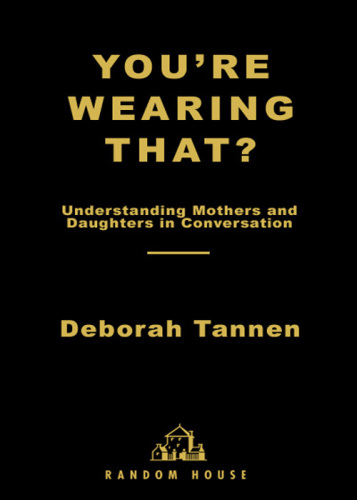
You're Wearing That?
Understanding Mothers and Daughters in Conversation
کتاب های مرتبط
- اطلاعات
- نقد و بررسی
- دیدگاه کاربران
نقد و بررسی

October 24, 2005
Tannen (You Just Don't Understand
; That's Not What I Meant
; etc.) continues to study human interaction through conversation, this time attempting to peel back the layers of meaning that make up conversations between mothers and their teenage and older daughters. While Tannen intends to clarify the ways in which mothers and daughters relate to each other verbally (through direct conversation; indirect messages, or "metamessages"; compliments or insults disguised as judgment; etc.), her own message is muddled by an overabundance of anecdotes and examples and too much stating the obvious. In chapters such as "My Mother, My Hair: Caring and Criticizing" and "Best Friends, Worst Enemies: A Walk on the Dark Side," Tannen seeks to examine every angle of various discussions and makes obvious comments, like "Where the daughter sees criticism, the mother sees caring.... Most of the time, both are right." She then expands on her comment with lengthy and often unnecessary explanations. While Tannen is astute in her observation that "Our relationships with our mothers go on way beyond their lifetimes, no matter what age we are when we lose them," she fails to clear up the mysteries between mothers and daughters. Agent, William Morris.

November 1, 2005
Like Tannen's previous books on interpersonal communication (e.g., "You Just Don't Understand"; "I Only Say This Because I Love You"), this is a medley of sociolinguistics, pop psychology, and self-help. This time, however, the subject at hand is -the complex and superloaded relationship between mothers and adult daughters. - Throughout, Tannen explains that her own relationship with her mother was fraught with resentment, frustration, and anger. In a similar self-expository vein, the many anecdotes and transcribed conversations between mothers and daughters included tend to mirror her personal experiences. She compares a daughter's rage at her mother's power to a fear of witches: -Because we are so close to our mothers, we fear that they will devour us. - A different researcher, one who has had a close and nurturing relationship with her mother, would probably have cited more positive, healthy examples. But Tannen does end on a proactive note, offering advice on improving difficult mother-daughter interactions that involves using humor, being less pushy, being more understanding, and avoiding back talk (which can, she warns, backfire). The popularity of Tannen's other books, coupled with the national publicity for this one, may elicit demand, so public libraries may want to purchase. [See Prepub Alert, "LJ" 9/1/05.]" -Ilse Heidmann, Washington State Lib., Olympia"
Copyright 2005 Library Journal, LLC Used with permission.

December 1, 2005
Talk is essential to women's relationships, best-selling (" You Just Don't Understand," 1990) linguistics professor Tannen maintains. This book responding to readers' feedback about the mother-daughter chapter in her " I Only Say This Because I Love You" (2001) argues that satisfying conversations between mothers and grown daughters can be the ultimate healing agents, a kind of Holy Grail for women. Or not. "Words are like touch. They can caress or they can scratch." The illuminating extracts from mother-daughter colloquies that she cites bring to life both the soothing ointment and the ripped-open scars possible in interchanges on issues indicated by the chapter titles "Involvement or Invasion," "Great Expectations," "Incompatible Style Differences," and "Difference Equals Distance," as well as age-old sources of conflict for this extraordinarily intense kind of relationship.(Reprinted with permission of Booklist, copyright 2005, American Library Association.)

























دیدگاه کاربران